
Benjamin Franklin by John T Morse (American Statesmen Series, Volume 1)
This is the first in a series of biographies written and/or edited by John T Morse. Not much is known about Mr. Morse. We do know that he was born in Boston in 1840 and died in 1937. At 97, he was the eldest living Harvard law graduate at that time. He presided over the creation of a 32 volume set (later expanded to 40) of American Statesmen biographies, writing several himself and assigning most to notable figures of the time like Theodore Roosevelt, Henry Cabot Lodge, Charles Francis Adams, and many others, which he then edited and marketed by subscription.
Morse had originally asked Theodore Roosevelt to write the biography of Benjamin Franklin. Roosevelt declined in March of 1888, but in a letter to Morse, he suggested that Morse himself write the Franklin biography. It was first published in 1889 and became Volume 1 of the set published in 1898.
Because there was much already written and well known about Franklin’s early years, Morse spent little time on his experiments and inventions, his early life, apprenticeship and publishing. He mentions these only generally to provide context. Morse’s treatise on Franklin’s life is instead focused on his considerable diplomatic achievements, his personality and character.
Morse called him “the first great American, the first man born on this side of the water who was meant for the universe.” In Morse’s chapters on Franklin’s services in France during the Revolutionary War, he says that he endeavored to “present the true facts and the magnitude of his (Franklin’s) usefulness more carefully than … has previously been done.”
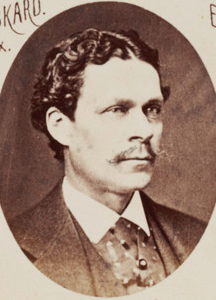
In reading a biography written over 130 years ago about a man who died nearly 100 years earlier, it is a necessary effort to become familiar with the syntax of both time periods. Passages from Franklin and his contemporaries quoted throughout the book and the author’s narrative, provide the reader with ample opportunity to meet the challenge.
Morse begins by conveying Franklin’s maturation process from free-thinker and boy printer to runaway apprentice to young journeyman. Upon his return from an 18 month stay in England, he became a husband and revealed to his new bride that he was father to an illegitimate son, William, a consequence of his prior wild oats. From all indications, she accepted the situation without issue.
Morse goes on to summarize Franklin’s philosophical and scientific contributions, and his dedication to public works and projects throughout Philadelphia, among the most important was a subscription library which became a model for all such libraries. Franklin also became postmaster of Philadelphia.
In 1832, Franklin begins the work that in the ensuing years will put him solidly in the homes of “nearly every shopkeeper, planter and farmer in the American provinces,” Poor Richard’s Almanac. Franklin says, “I was conscious that not a tenth part of the wisdom was my own … but rather the gleanings that I had made of the sense of all ages and nations.”
Franklin’s nature was to “teach, to preach, to moralize” and he had little use for creeds or formal religion, other than “useful morals, the gospel of good sense and the excellence of humanity.” In Franklin’s autobiography, he narrates his plan to write a book called “The Art of Virtue” to show “the means and manner of obtaining virtue” as opposed to “the mere exhortation to be good but (which) does not instruct or indicate the means.” He never completed this work but wrote of it regularly and kept the idea alive in his mind into old age.
Franklin became clerk of the Assembly and remained in that capacity until he himself became a member. Morse chronicles Franklin’s involvement with the ill-fated General Braddock in the French and Indian Wars, where for a short time, he found himself a colonel. (see Bradock’s March, reviewed here.) Franklin’s military career was creditable if brief.
As his reputation grew, his fame and prestige spread to England. He had become renown for his contributions to philosophy and science, and translations of his writings were done in French, Italian, German and Latin. The Assembly thought it wise for Franklin to go on a mission to England to seek redress with Parliament on tax and governance issues, considering the good opinion of Franklin on both sides of the Atlantic. Thus, Franklin began what became a 5 year mission as representative in England.
His mission was not successful, but in Morse’s accounting, Franklin made many acquaintances, traveled extensively, and became quite enamored with England notwithstanding. In fact, Morse points out that, had Mrs. Franklin not been so afraid of making the crossing, Franklin might have indeed remained in England. Franklin returned to Pennsylvania in late 1762, and Morse chronicles the growing enmity between Franklin and the sons of William Penn, who were proprietaries (land owners) and exerted power and influence for themselves at the expense of the citizenry. Franklin and the Assembly favored the monarchy to exert its influence, believing that the population would get a better shake. This created enmity between Franklin and those who were both jealous of his position and resentful of his influence. Franklin’s cool temper and ability to diffuse a fight were growing expositions of his character and served him increasingly well. As Morse says, “It is not in human nature to be so extravagantly abused in time of intense excitement and wholly to hold one’s peace.”
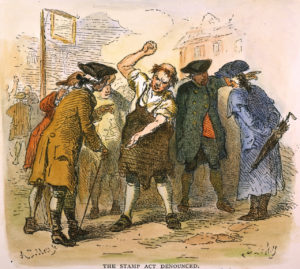 In 1764, he was once again off to England to urge a petition changing the government to be in opposition to the proprietaries. According to Morse, Franklin expected this to take less than 10 months. “In fact, Franklin did not get home for 10 years, and this especial errand soon sank into such comparative insignificance, though not actually forgotten, it could not secure attention.” The issues that instead demanded Franklin’s attention were in fact the very issues that were to dominate the long road to Revolution. The Stamp Act (passed in Parliament during Franklin’s voyage) changed Franklin from simply an agent urging a petition, to “the representative of a disaffected people maintaining a cause against … the great British Empire.”
In 1764, he was once again off to England to urge a petition changing the government to be in opposition to the proprietaries. According to Morse, Franklin expected this to take less than 10 months. “In fact, Franklin did not get home for 10 years, and this especial errand soon sank into such comparative insignificance, though not actually forgotten, it could not secure attention.” The issues that instead demanded Franklin’s attention were in fact the very issues that were to dominate the long road to Revolution. The Stamp Act (passed in Parliament during Franklin’s voyage) changed Franklin from simply an agent urging a petition, to “the representative of a disaffected people maintaining a cause against … the great British Empire.”
And thus the meat of Morse’s narrative gets underway. Franklin’s talents coalesced in this his longest trip to England. Morse writes that Franklin “was one who could combine force with moderation in the expression of his views, the force being all the greater for the moderation. He had an admirable head to conceive an argument, and tongue and pen to state it clearly and pointedly……he was a sounder political economist than any member of the English government; and above all, he had an unrivaled familiarity with the facts, the arguments and the people on both sides of the controversy; he kept perfect control of his temper without the least loss of earnestness; and had the rare faculty of being able to state his own side with plain force, and yet without giving offense.” In his testimony to members of Parliament between Feb 3rd and 13th , 1766 (regarding the Stamp Act and urging its repeal), he “displayed this ability to better advantage than any other single act in his life.”
Edmund Burke “likened the proceeding to an examination of a master by a parcel of schoolboys.” And thus the Stamp Act was repealed in March 1766.
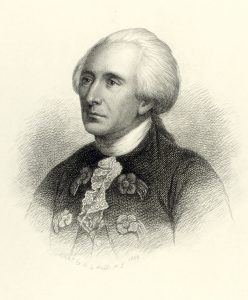 Franklin soon found himself by virtue of his accomplishment, appointed agent for New Jersey, Georgia and Massachusetts, but not without controversy and opposition from none other than Sam Adams, who was opposite Franklin in disposition and personality, easy to anger and mercurial as Franklin was calm and thoughtful. Morse makes the point that England knew very little about the colonies and Franklin found himself in the unenviable position of both instructing the English, and preaching reason and moderation to the colonists. This made Franklin distrusted by the more aggressive proponents of liberty (like Adams), and a target of opportunity for ambitious and amoral men like Arthur Lee of Virginia. This would plague Franklin in the coming years. As Franklin himself wrote in part: “Being born and bred in one…country and having lived long and made many agreeable connections of friendship in the other, I wish all prosperity to both; … I do not find that I have gained any point in either country, except rendering myself suspected by my impartiality …”
Franklin soon found himself by virtue of his accomplishment, appointed agent for New Jersey, Georgia and Massachusetts, but not without controversy and opposition from none other than Sam Adams, who was opposite Franklin in disposition and personality, easy to anger and mercurial as Franklin was calm and thoughtful. Morse makes the point that England knew very little about the colonies and Franklin found himself in the unenviable position of both instructing the English, and preaching reason and moderation to the colonists. This made Franklin distrusted by the more aggressive proponents of liberty (like Adams), and a target of opportunity for ambitious and amoral men like Arthur Lee of Virginia. This would plague Franklin in the coming years. As Franklin himself wrote in part: “Being born and bred in one…country and having lived long and made many agreeable connections of friendship in the other, I wish all prosperity to both; … I do not find that I have gained any point in either country, except rendering myself suspected by my impartiality …”
Morse gives a very competent accounting of the additional intrigues in Parliament and the influences of Pitt, Townshend, Lord North, Shelburne, the “the double and deceitful” Lord Hillsborough and Lord Dartmouth. Franklin found himself expending large energies navigating through the labyrinth of English politics, while trying to gain progress on the colonial agenda of trying to stop the English Parliament from levying taxes on the colonies.
On this point, however, there would be no conciliation. Franklin said in 1769 that matters were “daily tending to a breach and final separation”. Yet he believed that as long as war did not exist, he refused to admit that it was inevitable and he spared no effort to prevent it. Franklin’s “great dread was that the colonies might go so fast and so far, as to make matters incurable before thinking people were ready to recognize …a crisis as unavoidable.” He did not want to see the Revolutionary fervor lead to a premature disaster for the colonies. Morse’s narrative continues through the last months of Franklin’s time in England, the Hutchinson Letters, his dismissal as deputy Postmaster-General of North America, and his return home. Franklin’s wife died during his absence, and Morse makes no mention other than the fact of it
Upon Franklin’s return to America, blood had just been spilled at Lexington and Concord and this had immense meaning for Franklin, “it opened to his vision all the future: an irreconcilable struggle … independence … and bitter animosity long surviving.” After a pointless mission to Montreal, Franklin returned to participate in the convention to establish a constitution for the independent state of Philadelphia and then found himself one of a committee of five elected to frame a Declaration of Independence. It is in this endeavor that he uttered his famous and amusing reply to the call for unanimity, “we must indeed all hang together, or assuredly we shall all hang separately.”
From here Morse begins his chronicle of perhaps the most important chapter in Franklin’s life and service to his country … his appointment as Minister to France. Franklin’s contributions to the American Revolution are said by Morse to be only secondary to Washington himself. For Franklin was given the thankless and perpetually troubling task of raising money to fund the War. France, who had the most to gain from American independence from her arch enemy, Britain, would be the natural source of the vast majority of these efforts. But America had no credit, no financial resources and could only offer France concessions in trade and ships of products in future, as well as general promises of a post-war alliance which would surely strengthen its position with regard to England, assuming of course, America would prevail. And without money, she certainly would not.
The entire episode is ably chronicled by Morse along with fascinating details of Franklin’s life in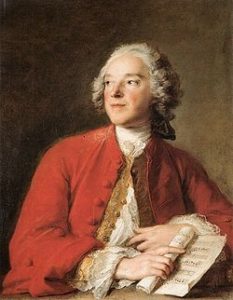 France. In addition, we learn the story of the intrigues which Franklin’s predecessor, Simon Deane, endured at the hands of the earlier mentioned and odious Arthur Lee. A fascinating French character, Caron de Beaumarchais used his influence in the Court of Louis XVI for the cause of American Independence, under the auspices of providing cargo to the French in exchange for sorely needed capital. (Beaumarchais is also known as the author of the plays, Marriage of Figaro and the Barber of Seville)
France. In addition, we learn the story of the intrigues which Franklin’s predecessor, Simon Deane, endured at the hands of the earlier mentioned and odious Arthur Lee. A fascinating French character, Caron de Beaumarchais used his influence in the Court of Louis XVI for the cause of American Independence, under the auspices of providing cargo to the French in exchange for sorely needed capital. (Beaumarchais is also known as the author of the plays, Marriage of Figaro and the Barber of Seville)
But the entire excruciatingly exhausting and often contentious dealings with which Franklin had to contend and his relationship with Comte De Vergennes, who was to have total control under the king in the business of supplying support for the colonies, forms the crux of Morse’s narrative. In this discourse, Franklin’s contributions cannot be overstated. Morse also tells the amazing story of how Franklin found the money, issued commissions, attended to purchases of supplies and equipment, and consulted for operations of John Paul Jones glorious feats in naval battles off the coast of England. (see The Admiral and Ambassador, reviewed here.)
The swarm of bills, loans, payments and drafts were extensive, and Franklin and his grandson were inadequate to keep up with the record keeping and correspondence. Congress was unhelpful and provided nearly no support. Franklin by this time was in his mid 70’s, and was also in charge of all the diplomacy of the United States, their consul-general, and was fielding the aggravations of his detractors.
Morse also relates the criticisms of Franklin and intrigues to De Vergennes by John Adams, and notes that the enmity between the two families (Adams and Franklin) proceeding from these (and future actions during peace negotiations) continued to be operative at the writing of this biography in 1889. In essence, Morse states the “simple truth …. that in Europe, Franklin was a distinguished man, while no other American was known or cared about at all. Franklin received deference, where others received civility … Franklin was selected for attentions.. flattery…official consultation, while his colleagues were forgotten entirely by the French people. The same was also true in England. When Britain wanted to advance some ministrations or communications, they too went to Franklin.
Jay, Dana and Carmichael accepted this situation in the spirit of sensible gentlemen, but Adams, and (Arthur) Lee….were incensed and sought an offset in defamation…..Adams was not sufficiently familiar with the modes of political life in Europe … to value …. Franklin’s prestige….”
Franklin was directly involved with the machinations of making the peace following Cornwallis’ surrender at Yorktown. Once again, Franklin was the one to whom overtures were made by England. Now that the war was ended, England sought to separate America and France, and negotiate terms that would favor their interests, or most accurately, not those of France. The peace process is fascinating and the interactions between John Jay, Adams, Franklin, De Vergennes and Oswald from England are well reported, as were the reproaches when the details of the peace agreement were made public. Naturally, concessions were made, as is the nature of negotiations, but Franklin endured charges from his critics that he was too preferential of France over his own country.
Franklin in his equanimity and wisdom wrote that “I have never known a peace that did not occasion a great deal of popular discontent clamor and censure on both sides……so that the blessing promised to peacemakers, I fancy, relates to the next world, for in this day, they seem to have a greater chance of being cursed.”
As to the increased antipathy between Adams and Franklin, Morse says this: “Adams was a relentless hater, and has bequeathed bitter diatribes, which, as they can never be obliterated, can never cease to excite the ire of admirers of Franklin. On the other side, Franklin at least has the merit of having left not a malicious line behind him.” Morse would not “apportion merits and demerits between these two great … and true patriots both …”
Franklin departed France in 1785 at the age of 78. The sea crossing of 7 weeks were spent writing. He arrived in Philadelphia in September and Morse’s concluding pages are dedicated to Franklin’s contribution during creation of the Constitution of the United States, and his final years. It was felt that “the sage of America” must be in attendance as the “fitness of things imperatively demanded Dr. Franklin’s venerable figure in the constitutional convention….”
Franklin at last retired from public life and spent the last 2 years in and out of bed due to his afflictions with gout and with kidney or gall stones. When he was able, he continued to write. He was courageous and cheerful. In November 1788 he wrote, “You kindly inquire after my health. I have not of late much reason to boast of it. People that will live a long life and drink to the bottom of the cup must expect to meet with some of the dregs…..but I enjoy many comfortable intervals in which I forget all my ills and amuse myself in reading or writing, or in conversation with friends, joking, laughing and telling merry stories, as when you first knew me. A young man about 50.”
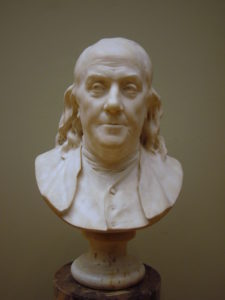 The author relates a humorous anecdote. In one of these intervals, he “wrote his paper condemning the liberty, which was becoming the license, of the press. If the law permitted this sort of thing, he said, then it should also restore the liberty of the cudgel.” Morse comments that “the paper is not altogether antiquated, nor the idea altogether bad!”
The author relates a humorous anecdote. In one of these intervals, he “wrote his paper condemning the liberty, which was becoming the license, of the press. If the law permitted this sort of thing, he said, then it should also restore the liberty of the cudgel.” Morse comments that “the paper is not altogether antiquated, nor the idea altogether bad!”
Franklin passed away on April 17, 1790.
John T Morse gives us a full bodied and fascinating look at a man who distinguished himself from his peers by his talents, service and virtues. Morse concludes, “It is hard indeed to give full expression to a man of such scope in morals, in mind and in affairs … by the instruction which he gave, by his discoveries, by his inventions, and by his achievements in public life, he earns the distinction of having rendered to men varied and useful services excelled by no other one man; and thus he has established a claim upon the gratitude of mankind so broad that history holds few who can be his rivals.”
 The posts are coming!
The posts are coming!


0 comments
Kick things off by filling out the form below.
Leave a Comment